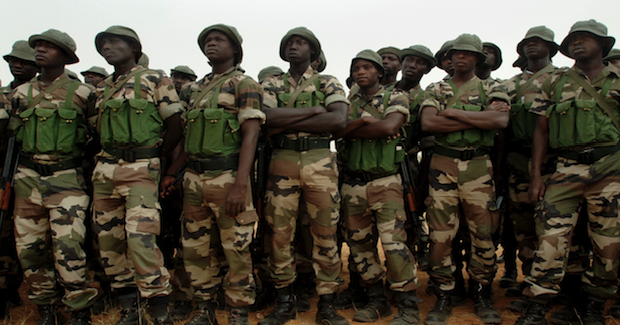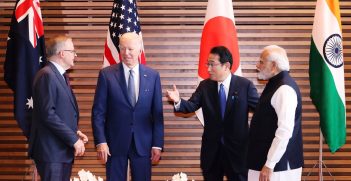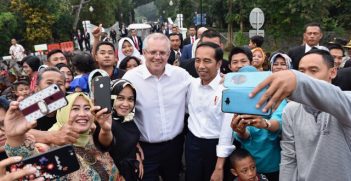How to Eliminate Boko Haram

Nigerian President Muhammadu Buhari is claiming a technical victory over Boko Haram, but his exclusively military approach may leave the political and economic conditions that led to violent extremism unresolved, resulting in continued insecurity for Nigeria.
Like most other countries on the African continent, Nigeria has suffered the turmoil of colonisation. The story of ancient societies thrust together inside haphazardly drawn state borders, along with the resulting destabilisation, violent conflict, widespread poverty and lawlessness is the African archetype. However, Nigeria stands apart in several respects. Not only is it the most populous African state with the continent’s largest economy by GDP, it is also home to Boko Haram, the world’s most violent terror group.
Beginning in 2003 as a conservative religious assembly, Boko Haram quickly transformed into a murderous, anti-state Islamic insurgency. The group, perhaps best known for its abduction of 276 schoolgirls in April 2014, had by 2015 seized an area of northeastern Nigeria roughly the size of Belgium. They killed or enslaved all who opposed them as they enforced their strict interpretation of Islamic law.
However, during 2016 Nigerian security forces have made significant advances into Boko Haram-held territory. They have successfully contained the terror group to the Sambisa Forest on the northeastern border of Nigeria. This comes as a welcome contrast to the bleak predictions made during 2014, before the involvement of Niger, Chad and Cameroon under Nigerian President Muhammadu Buhari’s renewed military offensive.
Although a military defeat of Boko Haram now appears conceivable, the Nigerian government must be sure to keep its boot firmly on its enemy’s throat in the interest of maintaining the current momentum. However, it is also high time the Nigerian government attended to the humanitarian and state-building measures that scholars have long maintained are necessary to address the underlying causes of extremist sentiment in the poor Islamic north of the country.
While the Nigerian government may not have the resources at hand to bankroll such development projects, it would cost little to address the enormous human cost of the Nigerian security forces’ recent offensive. It is a cost that is undoubtedly damaging efforts to quell violent extremism in the long term.
During 2016, the number of people killed by security forces rivalled that of Boko Haram. A portion of these losses may be considered the cost of preserving the speed, surprise and momentum integral to the success of an aggressive military offensive. However, it is fair to question how the total number of deaths attributed to security forces protecting the local populace could equal those attributed to a group actively seeking to spread terror though violence.
These transgressions by government forces against the civilian population only serve to ensure the perpetuation of anti-state mindsets in the community. As such, the Nigerian government must now begin working to rebuild trust if it hopes to achieve long-term security through the employment of counterinsurgency methods.
More than 40 years before General Petraeus and counterinsurgency expert David Kilcullen famously redirected wayward US military operations in Iraq, French military officer David Galula identified the ‘winning-over’ of the local population as the key to any successful counterinsurgency campaign. According to Galula’s concept, the resulting expulsion of the insurgents from the local population, which would otherwise act as their support network, acts to greatly diminish the insurgent’s capability.
This basic concept is not new, and is one that the Nigerian government would do well to engage with if it intends to find a long-term solution to the current crisis. In addition to removing the insurgent from his support network, Galula’s concept suggests that the most effective solution to kill ones enemy may not be to kill him at all, but to eliminate his motives for fighting. Moreover, the adage likening the killing of a popular terrorist to the beheading of the mythical Hydra tells us: where one is removed, another two shall grow in its place.
To successfully eliminate Boko Haram’s support network and their motivation to fight, the Nigerian government must refine its current use of military power to both minimise civilian casualties and provide a secure environment that allows for the employment of state-building activities addressing Boko Haram’s stated motivations.
These grievances are known; they are not buried under layers of incoherent and quasi-religious ramblings. The group has openly stated them from the beginning: the destructive aspects of Western influence on Nigerian society, politics and economy, in particular corruption. Another stated grievance is the economic inequality stemming from this corruption, particularly as it manifests itself along religious lines, disproportionately affecting the Islamic population of northern Nigeria.
Boko Haram attribute the failings of Nigeria’s political and economic system to British colonial influence. The post-colonial history of Nigeria establishes that Nigeria at independence did inherit a disorganised political system. However, subsequent failings at the hands of Nigerian politicians and the military during the republic’s formative decades magnified existing issues, including a government of incompetent and/or unwilling elites, widespread corruption, and institutionalised injustice creating systematic insecurity. Ultimately, these failings constitute the source of contemporary violent extremism in Nigeria.
It is also important to note that the discovery of oil in unindustrialised and poorly-governed Nigeria led to a resource curse-afflicted economy. A widely observed phenomenon, the factors central to the idea of the resource curse are the mismanagement of the newfound riches produced by a rapidly expanding economy, as well as the neglect and subsequent atrophy of all other industries resulting in widespread unemployment. Combined with corruption, this oil-centric economy opened a vast economic divide generating desperation and resentment in the poverty-stricken northern states of Nigeria.
The interaction between these factors produced the breeding ground for violent extremism that gave rise to Boko Haram, just as similar conditions gave rise to the Nigerian jihadi movements before it. Without observing the history of violent Islamic extremism and the underlying causes of it, the Nigerian government would appear fated to repeat a history of insecurity and violence.
President Muhammadu Buhari may claim victory over Boko Haram; however, the exclusively military nature of the current strategy to deal with violent extremism is short-sighted. Without concrete measures and policies aimed at addressing the underlying causes of violent extremism, months or even years later violence will re-emerge, whether it is under the banner of Boko Haram, the Islamic State or another nom de guerre.
Chris Roberts is a third-year student currently completing a bachelor of social science (security counter-terrorism) at Swinburne University of Technology.
This article is published under a Creative Commons Licence and may be republished with attribution.





